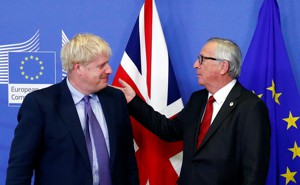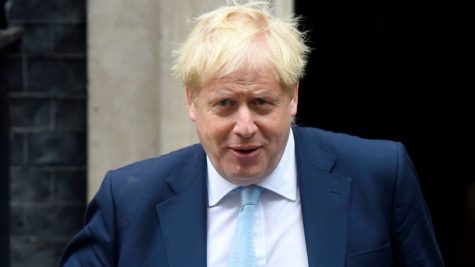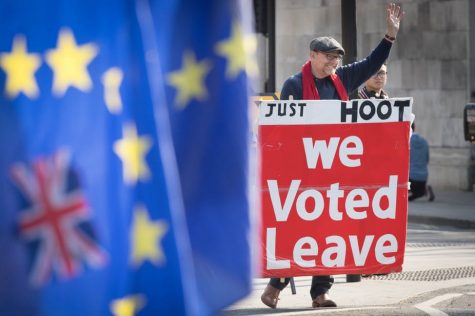New Brexit Delay Leaves UK in Limbo

Image courtesy of The Atlantic
October 22, 2019
Sunday night, UK Prime Minister Boris Johnson appealed to the European Union for an extension on the Brexit deadline. Now, the United Kingdom has until January 2020 to solidify a deal to leave the EU.
On Thursday, the UK Prime Minister Boris Johnson proposed a new Brexit deal, hoping to meet the previous October 31st deadline for Brexit. While the EU approved of his deal, it was met with lots of controversy at home. The opposition party in Parliament claimed that this deal would put the British economy in ruins, and that Johnson had tried to rush this bill due to being

under pressure. “[He’s] too eager by far to get a deal at any cost,” said Nigel Dodds, deputy leader of the Democratic Unionist Party in an NPR article. Parliament voted against the deal 322-306, and Johnson got the extension to put off Brexit for another two months.
To quote BBC article “Brexit: All You Need To Know About Leaving the UK”, “The EU is an economic and political union involving 28 European countries. It allows free trade and free movement of people to live and work in whichever country they choose.” Two years ago, the general public of the UK voted 52% to leave the EU. The United Kingdom has struggled for years on forming an agreeable deal to leave the EU. Former Prime Minister Theresa May resigned in May after facing opposition for her Brexit deals.
The major issue that is causing such delay is Ireland. After Brexit, the Irish Republic would be a part of the EU, and Northern Ireland would not. Because the free trade that existed under the EU wouldn’t apply anymore, and Northern Ireland would be a part of a new customs zone, there would need to be a customs border separating the two nations. This could potentially reignite violent old tensions between the two countries, as put in NPR article, “Even With A New Agreement, Brexit Is Not A Done Deal. Here’s Why”. “Customs

checks along the Irish border would emphasize the partition of the island, and there are fears that the goodwill developed since the 1998 Good Friday peace agreement would be lost, and that there could even be violent attacks on customs posts.”
The United Kingdom’s solution to this problem so far has been the “backstop”, an agreement that Ireland would never have a hard customs border in order to avoid conflict and violence. However, this would see the UK stuck in the same customs region as the EU, making it so that the UK could not control its own trade, nullifying the point of Brexit.
Boris Johnson’s plan had taken a new route with dealing with Ireland. According to the same BBC article previously mentioned, “Under the plan, the whole of the UK will leave the customs union. But Northern Ireland will also remain an entry point into the EU’s customs zone.” The new customs border would be the Irish Sea, between Ireland and mainland UK. This means that whatever tariffs the UK would decide to put on imported goods would not apply to goods entering Northern Ireland (as long as they were not headed to Britain). The deal also includes a provision that after four years, the Northern Ireland government will be able to vote on whether Northern Ireland will continue this agreement.
Once Brexit goes through, and the UK becomes a separate customs region, goods being imported to the UK would have to stop for customs checks. This could lead to delays at ports and railroads, with some economists believe that this could cause traffic bottlenecks, disturbing trade routes and damaging the economy. A traffic bottleneck could potentially lead to shortages in some foods and medicines.
But the public is growing ever more unsympathetic towards Brexit, with a recent poll in the Guardian showing that 59% of the UK population support not going through with Brexit, and remaining in the European Union. This faction of “remainers” has grown as the UK government fails to come up with comprehensive plans, and as more economic data comes out about Brexit. Some have even called for a new vote, claiming that the public wasn’t educated enough to be able to decide during the first vote. But Parliament is not likely to let that happen, as it would set a dangerous precedent of “re-doing” democracy when you do not like the outcome.

https://www.bbc.com/news/uk-politics-32810887
https://www.bbc.com/news/uk-politics-50079385
https://www.theguardian.com/commentisfree/2018/dec/20/polls-stay-eu-yougov-brexit-peoples-vote
